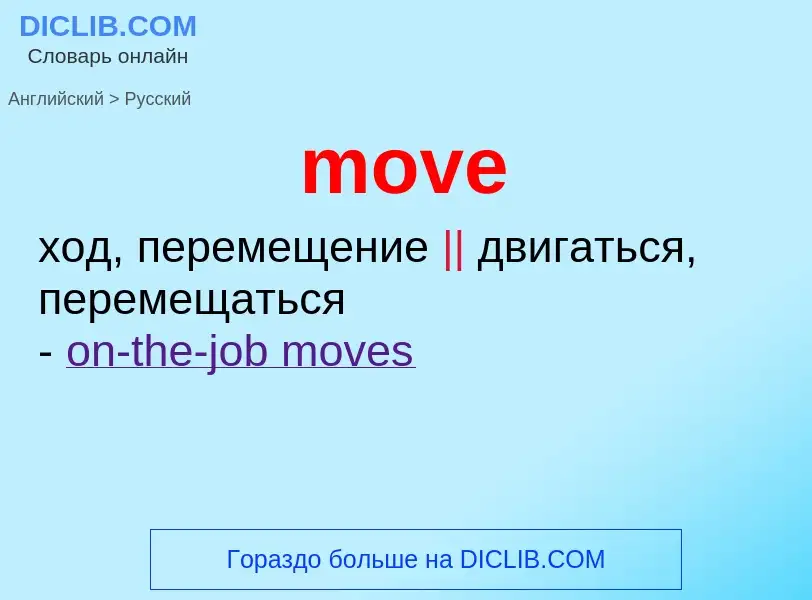Μετάφραση και ανάλυση λέξεων από τεχνητή νοημοσύνη
Σε αυτήν τη σελίδα μπορείτε να λάβετε μια λεπτομερή ανάλυση μιας λέξης ή μιας φράσης, η οποία δημιουργήθηκε χρησιμοποιώντας το ChatGPT, την καλύτερη τεχνολογία τεχνητής νοημοσύνης μέχρι σήμερα:
- πώς χρησιμοποιείται η λέξη
- συχνότητα χρήσης
- χρησιμοποιείται πιο συχνά στον προφορικό ή γραπτό λόγο
- επιλογές μετάφρασης λέξεων
- παραδείγματα χρήσης (πολλές φράσεις με μετάφραση)
- ετυμολογία
lucky move ‹hit, shot› - translation to ρωσικά
[mu:v]
общая лексика
пересылать
перемещать объект в другое место (ОЗУ, каталог и т.п.)
двигать
двигаться
движение
делать ход
перебросить
передвигаться
перемещать
перемещаться
перемещение
подвигать
страгивать
стронуть
стронуться
ход
машиностроение
передвижка
вычислительная техника
пересылка
строительное дело
ход, перемещение
двигаться, перемещаться
нефтегазовая промышленность
транспортирование
передвижение
перебазировка
переброска (буровой установки)
транспортировать
передвигать
перевозить
передвигаться (о нефти, газе)
антоним
существительное
[mu:v]
общая лексика
движение
перемена положения
места
перевозка
транспортировка (продукции в пределах предприятия)
ход (в игре)
переезд (на другую квартиру, в другое место)
поступок
шаг
военное дело
переброска
передвижение
политический термин
акция
редкое выражение
предложение
глагол
общая лексика
двигать
передвигать
перемещать
двигаться
передвигаться
перемещаться
шевелить
шевелиться
делать ход
ходить (в игре)
приводить в движение
переезжать
переселяться (на новую квартиру и т. п.)
перевозить
переселять
действовать
принимать меры
развиваться (о событиях)
идти
подвигаться (о делах)
бывать
вращаться (в определённом кругу, обществе)
трогать
волновать
быть движимым
испытывать внутреннее побуждение
побуждать
заставлять
доводить (до какого-л. состояния)
вносить (предложение, резолюцию)
делать заявление
(обыкн. for) ходатайствовать
редкое выражение
поднимать (мятеж)
провоцировать (войну)
техника
манипулировать
управлять (рычагами)
медицина
заставить действовать (кишечник)
физиология
действовать (о кишечнике)
коммерция
продавать
продаваться
иметь спрос
Ορισμός
Βικιπαίδεια
Your Hit Parade was an American radio and television music program that was broadcast from 1935 to 1953 on radio, and seen from 1950 to 1959 on television. It was sponsored by American Tobacco's Lucky Strike cigarettes. During its 24-year run, the show had 19 orchestra leaders and 52 singers or groups. Many fans inaccurately referred to the show as The Hit Parade.
When the show debuted, there was no agreement on its title. The press referred to it by several names, with the most common being "Hit Parade", "The Hit Parade", and even "The Lucky Strike Hit Parade", also "The Lucky Strike Parade". The program title officially became "Your Hit Parade" on November 9, 1935.
Every Saturday evening, the program offered the most popular and bestselling songs of the week. The earliest format involved a presentation of the top 15 songs. Later, a countdown with fanfares led to the top three finalists, with the number one song for the finale. Occasional performances of standards and other favorite songs from the past were known as "Lucky Strike Extras".
Listeners were informed that the "Your Hit Parade survey checks the best sellers on sheet music and phonograph records, the songs most heard on the air and most played on the automatic coin machines, an accurate, authentic tabulation of America's taste in popular music." However, the exact procedure of this "authentic tabulation" remained a secret. Some believe song choices were often arbitrary due to various performance and production factors. The show's ad agencies—initially Lord and Thomas and later Batten, Barton, Durstine & Osborne—never revealed the specific sources or the methods that were used to determine top hits. They made a general statement that it was based mainly on "readings of radio requests, sheet music sales, dance-hall favorites and jukebox tabulations"; Radio Guide claimed "an endless popularity poll on a nationwide scale."

